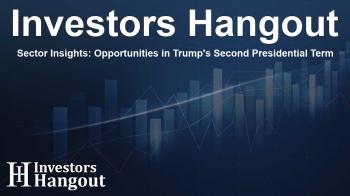Sector Insights: Opportunities in Trump's Second Presidential Term

Examining Sector Performance In Trump's Second Term
As Donald Trump embarks on his second term as President, it is intriguing to analyze how various sectors performed during his first term. Some trends might catch you off guard. Moreover, there's a strong possibility that certain sectors that may have lagged previously could see significant improvements moving forward.
This article aims to dissect the standout performers and underachievers during Trump's initial presidency and contrast these findings with the performance of sectors under the Biden administration. We’ll delve into how the dynamics might shift, especially in sectors like energy and finance, which are anticipated to benefit under Trump 2.0.
Trump's First Term: Sector Performance Overview
Throughout Trump's first term, the S&P 500 experienced an astounding increase of 80%, outpacing the impressive 65% increase seen with the Biden administration. However, the story changes significantly when we look at specific sectors. The technology sector witnessed a remarkable growth of 174% under Trump, while under Biden, it achieved an 84% increase. Similarly, consumer discretionary experienced a robust rise of 109% under Trump, in stark contrast to a 38% increase under Biden. Health care was another sector that thrived, achieving an 81% growth during Trump's term compared to a much lower rate of 26% under Biden.
A surprising development revealed through this analysis was the energy sector's performance, which saw a return of -29% under Trump, yet flourished with a 151% increase during Biden's presidency. This could challenge the assumption that Trump’s support for fossil fuels would inherently enhance the energy sector while Biden’s focus on renewables would dampen it. The significant rise in oil and gas prices, especially following global events, has notably influenced energy companies' profits. Currently, the price of West Texas Intermediate (WTI) Crude Oil is approximately 40% higher than when Biden took office, reaffirming the drastic shifts the sector can experience.
Expected Benefits for Sectors in Trump's Second Term
Looking ahead, many believe that sectors that faced challenges during Trump's first term will experience renewed opportunities, specifically energy and financials. Given Trump's inclination towards deregulation, which is evident from statements advocating for increased energy production, the expectation is that energy companies could see elevated profit margins through reduced operational costs.
Nevertheless, oil and gas stock performance will still largely hinge on global market prices—a factor that the President can't directly manipulate. Importantly, the mere act of increasing supply could inadvertently suppress prices. Moreover, any tariffs imposed on foreign oil could negatively impact refining companies reliant on imported resources to produce gasoline.
In contrast, the financial sector may witness a more tangible impact from Trump's policies, particularly concerning M&A activity. Bank executives have expressed optimism regarding the operational environment, which could spurge revenue increases within various banking divisions. This uptick in merger activities would subsequently elevate fee revenues for advising institutions.
Potential Funds for Consideration in Trump's Administration
Several funds are positioned to benefit amidst Trump's financial policies. The Financial Select Sector SPDR Fund and the Invesco KBW Bank ETF (NASDAQ: KBWB) are expected to thrive, although it's essential to clarify that they may not necessarily outperform all other sectors. The broader market dynamics often play a more significant role than presidential policies.
Additionally, the Technology Select Sector SPDR Fund presents a viable investment avenue. Recent developments surrounding AI ventures, namely DeepSeek, have led to fluctuations within tech stocks, yet the sector remains robust. Consequently, diversification provided by funds like XLK holds considerable value as the market continues to evolve.
Frequently Asked Questions
What sectors are expected to perform well during Trump's second term?
Energy and financial sectors are anticipated to benefit significantly due to potential deregulation and increased M&A activities.
How did Trump's first term impact the stock market?
During Trump’s first term, the S&P 500 experienced an 80% rise, with technology, consumer discretionary, and healthcare sectors leading in performance.
Are there specific ETFs to watch during this period?
Yes, the Financial Select Sector SPDR Fund and the Invesco KBW Bank ETF (NASDAQ: KBWB) are two funds projected to perform well under Trump's administration.
What challenges might the energy sector face under Trump?
The energy sector could struggle with fluctuating oil and gas prices, which remain largely outside the President's control.
How can financial companies benefit from Trump's policies?
Financial companies may benefit from increased M&A activity and potential deregulations in banking policies, leading to higher revenue streams.
About The Author
Contact Hannah Lewis privately here. Or send an email with ATTN: Hannah Lewis as the subject to contact@investorshangout.com.
About Investors Hangout
Investors Hangout is a leading online stock forum for financial discussion and learning, offering a wide range of free tools and resources. It draws in traders of all levels, who exchange market knowledge, investigate trading tactics, and keep an eye on industry developments in real time. Featuring financial articles, stock message boards, quotes, charts, company profiles, and live news updates. Through cooperative learning and a wealth of informational resources, it helps users from novices creating their first portfolios to experts honing their techniques. Join Investors Hangout today: https://investorshangout.com/
The content of this article is based on factual, publicly available information and does not represent legal, financial, or investment advice. Investors Hangout does not offer financial advice, and the author is not a licensed financial advisor. Consult a qualified advisor before making any financial or investment decisions based on this article. This article should not be considered advice to purchase, sell, or hold any securities or other investments. If any of the material provided here is inaccurate, please contact us for corrections.

